Neighbours eye Iraq elections
Outcome of the poll may affect national interests of Iran and Saudi Arabia.
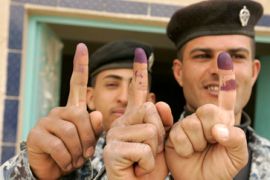
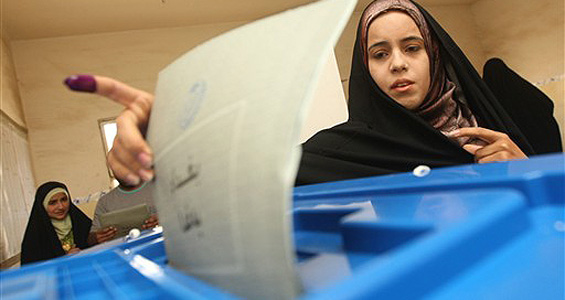 |
| Despite violence on election day, voter turnout has been high at the 50,000 polling stations [AFP] |
In the run-up to today’s historically significant parliamentary polls in Iraq, a volume of commentary has been offered on the complex internal dynamics in play and their critical import for the future direction of the country.
But a question that begs asking is where do Iraq’s neighbours stand on these critical elections.
| special report |
 |
Given the volatile reality of the Middle East and its tortuous geopolitics, states in the region have an intimate interest and much at stake in how their neighbours are run.
With much at risk for the stability of Iraq and its concomitant effects on bordering states, today’s elections will be watched with great anxiety in capitals across the Middle East.
Tehran, in particular, will be following electoral developments over its western border in Iraq. Iranian foreign policy vis-à-vis Iraq is not necessarily ideological in its underpinnings. It is misleading to analyse Iran-Iraq relations through the prism of a Shia alliance.
Pragmatic calculations
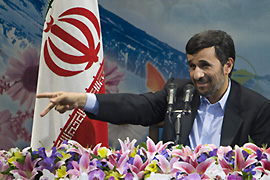 |
| Iran’s interest in Iraq stretches far beyond sectarian importance [REUTERS] |
Whether under a Shia dominated theocracy, a secular democratic Iran, or any other form of political rule in Tehran, the country’s Iraq policy would be based, at any given time, on pragmatic calculations to meet security and strategic objectives measured against realities on the ground.
Clearly, given the state of US-Iran relations today, Iran is in favour of the withdrawal of US combat troops from Iraq, and as a consequence, rather wary of any renewed post-election violence that may derail the withdrawal plan scheduled for the end of August.
A stable Iraq, free from ethnic strife is in line with Iran’s national interests. The last thing Iran needs is a disintegrated Iraq, with an energised surge of ethnic and sectarian clashes causing havoc in the country, placing Iraq’s territorial integrity at risk, and producing a refugee flow to its borders – a consequence of internal Iraqi instability that Jordan in particular is well too aware of.
The former is a disastrous precedent for Tehran given Iran’s ethnic diversity and internal geopolitics.
Backyard threat
These same calculations are commonly shared by other regional players. Syria, for instance, also views the US in its backyard as a potential threat, despite prospects for a more nuanced US foreign policy under the auspices of Barack Obama, the US president.
Similar to Iran, Syria and Turkey with significant minority populations of their own will frown upon any election outcome that may ignite ethnic rivalries and threaten to spiral the country toward civil war. In particular, any result that will reinvigorate calls for a separate Kurdish free state will be a direct national security threat to all three nations.
Iran, along with other regional stake holders, will therefore be looking to see an election outcome in Iraq, which establishes a strong central government capable of maintaining stability in the country. Contrary to popular belief, an independent and united Iraq is in step with Iran’s interests.
A divided Iraq with weak regional groupings separated along ethnic lines, each competing for control in the country will render these factions susceptible to foreign tampering.
This is a scenario Iran considers a serious security threat to be avoided.
Nuclear ally?
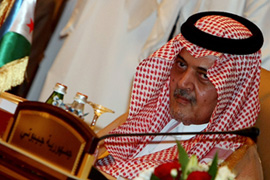 |
| Saudi leaders hope Iraq does not disintegrate into ethnic war, affecting their minorities [AFP] |
Although a Shia dominated post-Baathist Baghdad, say under Maliki’s Islamic Dawa Party, is propitious to Tehran, the latter in line with its strategic aims, will be looking to reach out to actors across the sectarian divide and employ soft power to establish closer economic, political, cultural and security ties with Iraq.
While perhaps too optimistic on the part of Iranians, in particular given the eight-year bloody war fought between the two nations in the 1980s, Tehran hopes that a friendly Baghdad may also mean added support from an ally on its nuclear dossier.
As for Saudi Arabia, ethnic uprising in Iraq is also seen as a dangerous outcome of the elections. The country’s minority Shia populations form a majority in the country’s oil rich eastern province of Hasa – a cause of great anxiety for Riyadh. Quite simply, Saudi Arabia’s national interests will be jeopardised by a fragmented and chaotic Iraq in its backyard.
In the geopolitical tug of war in the Middle East, Saudi Arabia is also displeased seeing Iran – which it perceives as a Shia challenger to its Sunni bid for regional influence – re-emerge as a regional power after the US invasion of Iraq in 2003.
Iranian-Saudi tensions
And while Iran and Saudi Arabia at the 2007 International Islamic Unity Conference pledged to ensure that Sunni and Shia branches of Islam are not exploited, and gave assurances to reduce sectarian strife in the region, suspicions and tensions between the two countries remains high.
Bref, Saudi Arabia will be opposed to any significant leaning or gravitation from Baghdad toward Tehran.
Saudi Arabia has even refused to open an embassy in Baghdad under Prime Minister Nouri al-Maliki’s term; the latter with close Iranian connections sees Baghdad’s relations with Tehran to be in the country’s national interests.
Although a unified Iraq is deemed by neighbouring states to be an auspicious outcome, an overly strong Iraq as a rising power in the region, equipped with American military goods will be perceived as malign.
And while today’s Iraq is vastly different than its predecessor under Saddam Hussein’s reign, Iraq’s belligerence in the past – Iraq’s invasion of Iran and Kuwait are obvious examples – is still very much vivid in the collective memory of the region.
Countering the Washington nexus
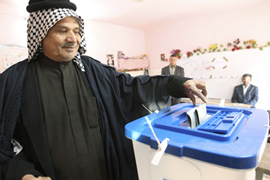 |
| There could be opportunity for real democracy out of the ashes of the US invasion [REUTERS] |
Whether this is a perception hurdle or potentially a real strategic threat, to counter its realisation, neighbouring states will likely aim to minimise Baghdad’s nexus with Washington, and simultaneously work to fortify their own privileged status with the Iraqi government.
For countries like Turkey and Jordan with close ties with the US, this will of course be a tricky affair, requiring finesse and tactful diplomacy.
To some extent, the same could be said about Syria.
Although Damascus may be timidly yet increasingly open to rapprochement with Washington, it sees in Iran a close historical ally and strategic partner. It would be interesting to observe how Israeli-Iraqi relations evolve from a new Iraq. In the current geopolitical map of the region, Israel’s interests favour strong ties between Baghdad and Washington.
The snapshot outlined above raises a fundamental point, and that is as long as the region as a whole stays divided, its existing geo-political realities will continue to generate power-plays and zero-sum competition.
This regional formula is destined to continue to leave victims in its tracks, keeping the region weak, and prohibiting its progress. While beyond the scope of this commentary, suffice it to say that for the region to finally see prosperity and progress both as individual sovereigns and in the collective, it needs to work toward a regional alignment founded indigenously by and for Middle Eastern states.
A regional organising framework has the potential to act as a constructive game changer for the Middle East in the 21st century.
The invasion of Iraq in 2003 was in breach of international law, and its aftermath of carnage and violence, the cause of great suffering for the Iraqi people. Yet perhaps there is solace in knowing that in every tragedy, there is opportunity.
Freed from Saddam Hussein’s iron rule, the Iraqi people, of all ethnic and religious stripes, have now been presented with a unique opportunity to shape their own destiny and hand-in-hand lay the foundation for a new united and democratic Iraq.
In the words of Fareed Zakaria, this is a historic opportunity that “is perhaps the beginning of [Iraq’s] return to prominence in the Middle East.”
Iraq, reborn
As policy briefs are being exchanged in the world’s capitals in anticipation of the results of Iraq’s parliamentary elections, people who yearn for democracy across the region are optimistic.
From the streets of Iran to the shores of the Mediterranean and Red Seas they hope to see their Iraqi brothers and sisters triumph – devoid of sectarian violence – in their arduous and long overdue quest for responsible rule by consensus, independence and prosperity.
Such a reborn Iraq in the heart of the Middle East, true to form to its glorious past, can act as a model for the region in this new century. A peace-loving, stable, flourishing and genuinely democratic Iraq is not only good for the goose, but equally for the gander.
Sam Sasan Shoamanesh is the co-founder and associate editor of Global Brief, Canada’s first foreign policy magazine (www.globalbrief.ca). The magazine’s website features, inter alia , Arabic, Farsi, Dari and Turkish language blogs.
He is also an attorney specialized in international law. His experience in the discipline has been acquired at the United Nations-International Criminal Tribunal for the former Yugoslavia, the International Court of Justice and the International Criminal Court, where he has served since 2005.
The views expressed have been provided in the author’s personal capacity, are the author’s own and do not necessarily reflect the views of his current or previous employers or A Jazeera’s editorial policy.